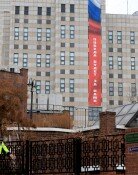Professors, Researchers Speak Out on Government Economic Policies
Professors, Researchers Speak Out on Government Economic Policies
Posted June. 18, 2005 04:32,
Politics Should Not Be Steered Toward a Collision Course-
The song we need to sing now is not a march for the One that never wavers until a new day comes, but a song of the 21st century that advances that new day, said Song Ho-keun, professor of sociology at Seoul National University. The kind of leadership we need is not one of anger where the leader enforces his opinion on others and denies the past. We need a leadership of harmony where the leader embraces his peoples wishes and transforms himself.
Songs remark came on Friday during his lecture to a monthly breakfast for CEOs at the Federation of Korean Industries main hall in Yeouido. Song also pointed out, At this point, when countries around the world compete against each other, it is imperative for us to prepare for the future. It is undesirable to reveal only the negative aspects of our past.
General Lee Sun-shin demonstrated a leadership of harmony. He prepared for the future with his wisdom of recognizing talent, trust in his soldiers, respect for their opinion, and devotion to his work under harsh circumstances, explained Song. It is regrettable that a negative perspective born from the collision between generations is predominant in our society today. Politics should not be steered toward collision, but integration.
Song predicted, The future of our country depends on how the community-minded 386 generation in their 40s and the individualistic post-386 generation in their 20s to mid-30s collaborate with each other.
Touching upon economic policies, Song said, Current economic policies are confined to domestic issues only. When considering the decentralization of the Seoul metropolitan area, we should take a global perspective and think how to heighten our competitiveness on the world stage instead of taking a domestic perspective and talking about how to disperse resources in this small country.
Regulating Newspaper Market Share Is Step in Wrong Direction-
The reason this government fails to reap successful results although it is making all out efforts for innovation is that the innovation itself is headed in the wrong direction. Belated as it may be, the government should shed its anachronistic mindset of formulating a one-size-fits-all solution to all problems and initiate innovation that meets the global standard, said Chairman Kim Kwang-woong of the Political Reform Committee, an advisory board for the National Assembly.
Kim, a professor of public administration at Seoul National University, severely criticized the governments policies on Friday in an article titled, The Government Innovation of the Roh Moo-hyun Administration and Its Assessment, posted on his website, www.finegovt.com.
Kim, who headed the Nomination Evaluation Committee for the ruling Uri Party in last years general election, wrote, The government has produced policies that are neither right nor acceptable and has refused to relax regulations. The result is a bloated administrative organization.
Kim cited the so-called three no`s of education policy: no high school grading system, no college admissions through donations, and no individual university entrance exam, and press policies, such as regulation of newspaper market share, as the policies headed in the wrong direction. Kim referred to the real estate policy and the tax increase as examples of unacceptable policies.
.
Kim quoted a World Bank report released last month and wrote, Korea has a mediocre administrative management rating among 209 nations around the world, and its placement has declined from that of two years ago. This is because the government is leaning toward becoming a bloated nation with a big government, as shown in the expansion of high-level officials and administrative organizations. The government created 16 more ministerial and vice ministerial posts and 12 additional advisory boards and organizations over the past two years.
Fears of Prolonged Economic Recession Cased by Policy Mix Up-
The current economic recession in Korea is largely attributable to the policy mix up of the government. There is a possibility that the lack of vitality in our economy could worsen into a prolonged recession, said Kim Jung-woong, president of the Hyundai Research Institute, on Friday in his lecture at a breakfast meeting hosted by the Korea Chamber of Commerce at the Westin Chosun Hotel.
Kim said, Unlike the dire economic conditions currently playing out in South America and Japan, the situation in Korea is largely due to the instability caused by the governments policies, such as policy mix ups and their unfeasibility. Despite sound economic fundamentals, our economy is giving a lackluster performance largely due to the lack of policy feasibility.
Kim asserted, The Participatory Governments policy gave more weight to distribution, which undermined our growth potential. Policy mix ups caused by too much focus on subcommittees and inconsistent policies have also dampened our economy.
Kim also predicted, Policy dilemmas, sluggish domestic consumption, a decrease in exports, high oil prices, and other domestic and overseas economic conditions could turn for the worse, resulting in a prolonged economic recession.
Kim added, The government predicted that our economy would grow at around five percent this year, but private research institutes have measured the growth rate at around four percent. The economy needs to grow at an annual rate of six percent in order to absorb the new workforce every year. The fall in the potential growth rate could mean the beginning of a low-growth era.
Kim suggested, In order to revitalize the economy, we need to change the economic policies that could expand the economic capability of the private sector such as enterprises and making full use of market economy principles.







